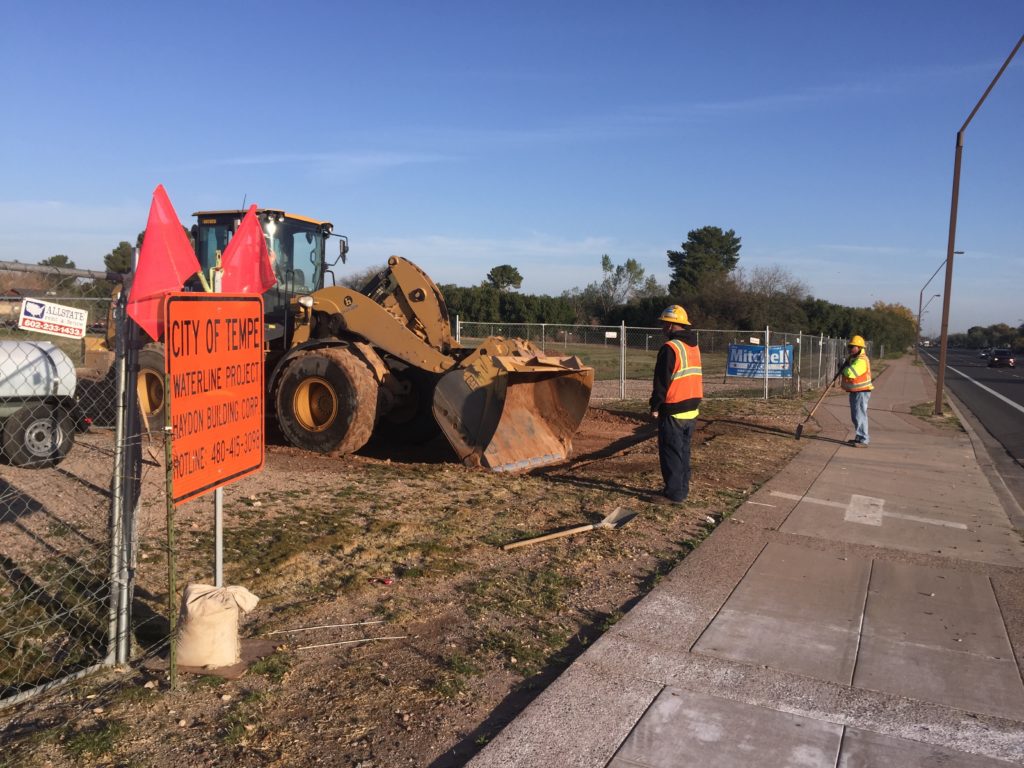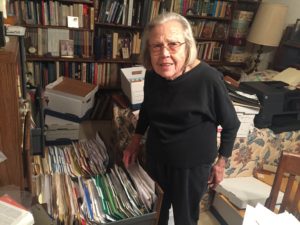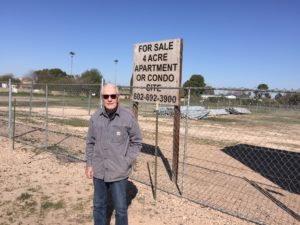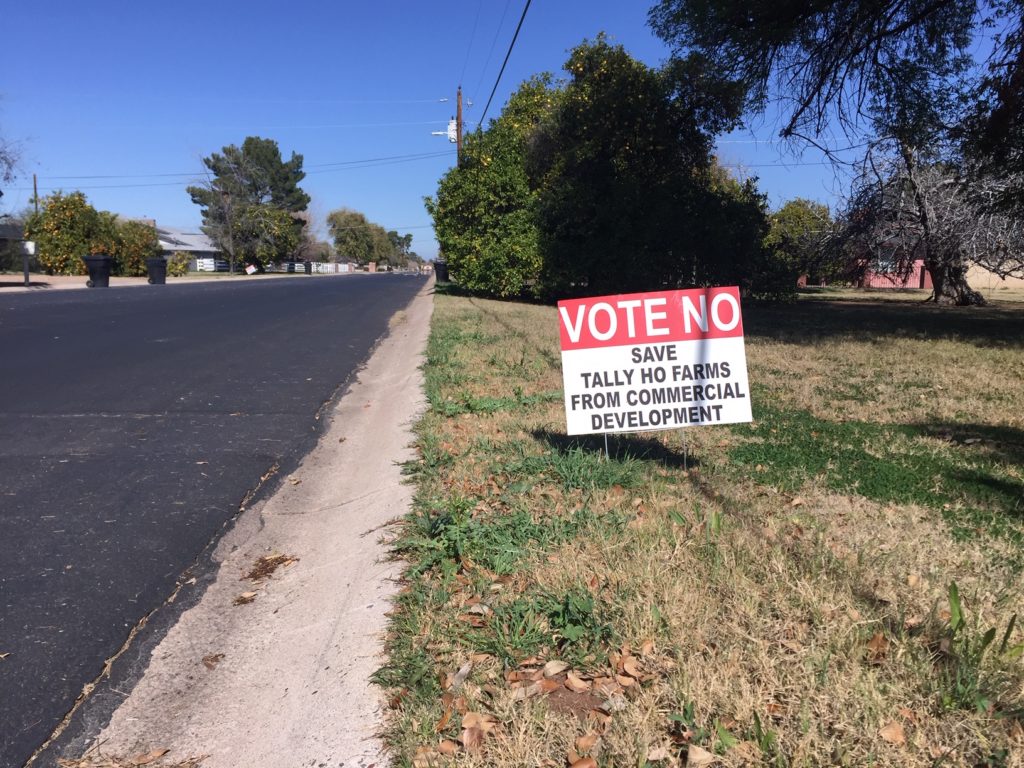
Special report & photos by Joyce Coronel
A vacant lot at the northwest corner of Rural and Warner roads stands at the center of a long- swirling controversy that has bitterly divided a South Tempe neighborhood.
When a chain link fence popped up days ago along much of the lot’s perimeter, and a large trailer and neatly stacked pile of pipes appeared, area residents began to wonder: Are those four dusty acres about to be developed?
They may have missed the small orange sign that sprouted alongside the trailer: The city of Tempe, it turns out, will be working on some water lines in the area.
However, that seems to be only part of the story.
Steve Tseffos, one of the owners of the parcel, said he and his partner, Tally Ho Farms resident Bill Fautsch, have leased a portion of the 3.7-acre parcel to a company doing the construction work for the city, but they say the property also is “under contract.”
So what exactly does that mean?
“That’s as much as we actually want to say right now but you can pretty much deduce when somebody says it’s under contract that somebody’s trying to do something with it,” Tseffos said.
Longstanding disagreement
For years, some residents of Tally Ho Farms, the neighborhood that shares a property line with the vacant land, have opposed commercial development of the parcel.
But other South Tempe residents disagree with the idea of developing the property.
A resident of the Alta Mira subdivision, east of Tally Ho Farms, said he’s hoping the corner will be developed. “It’s an eyesore,” the man said. “I don’t know what the owner has in mind—I don’t know what he’s waiting for, but I wish he’d find it.” Admittedly though, he said, the property in question is not adjacent to his backyard.
Shirley Albertson’s property is. She’s lived in the same home in Tally Ho Farms for 49 years. “Back then, the biggest traffic hazard was sheep,” Albertson said.

When investors eventually bought the empty lot behind her home, Albertson said she and her late husband, joined by another neighbor, approached the new owners and showed them the deed restrictions they intended to enforce.
“And for 20 years, they have tried everything under the sun to get around those deed restrictions,” Albertson said. Then, in 2017, Gov. Doug Ducey signed a law that makes it easier to amend covenants, conditions and restrictions.
According to Tseffos, that new law means that instead of needing 100 percent of a subdivision to agree to change the CCRs, now it’s only 51 percent. He called the Tally Ho Farms original deed restrictions “draconian” and said only a “small minority of people” oppose commercial development of the corner. He said he and Fautsch went around the neighborhood collecting signatures to amend the CCRs to remove the vacant land from the Tally Ho Farms subdivision.
“Our position is that it no longer falls under that as a result of this new state law,” Tseffos said. “In the past, Shirley Albertson and those guys blocked this thing by saying ‘We’re not going to sign.’ Well, now the way things work is, it’s already been amended.”
Albertson stands by her viewpoint.

“Commercial development will ruin the neighborhood. Who wants a business right on their property line? I think it’s wrong of them to ruin the neighborhood just for personal gain. They want big bucks. They can make money on their investment— one to four houses can go in there.”
Tseffos disagrees. He says market studies show no one wants to live on that corner and that traffic counts support commercial development.
“The important corners that are left in Tempe need to produce something for the taxpayer. This is an opportunity to collect tax dollars that benefit the entire city.”
Tempe City Councilmember Jennifer Adams weighed in on the controversy. “I believe if we work closely with the surrounding neighbors we can have the corner turn into something that will benefit our entire community and city,” Adams said.
She’s not alone in her assessment. Scott Agnew, a longtime Realtor in the area, offered a similar take: “The great people of South Tempe are going to enjoy more options and more convenience as a result of the entrepreneurs. It may feel disruptive to some of the folks in the immediate neighborhood so that’s the challenge with commercial growth,” Agnew said.
“Overall many residents benefit in the end. Tempe needs projects like this and so does the community.”
“People have come to us and said, ‘Please do something there I can walk to or ride my bike to—put something there that’s usable for the neighborhood,’” Tseffos said. “The fight is behind us. Hopefully we can all come together as a community and see what works best for the entire community.”
But before anyone breaks out the champagne, there’s this:
Dale Zeitlan, the attorney representing Albertson and other Tally Ho Farms residents opposed to commercial development of the empty land, said the property in question was not removed from the Tally Ho Farms subdivision by the 2017 law and therefore is still subject to the original deed restrictions that preclude commercial development.
And while Tseffos and Fautsch say they gathered enough signatures of Tally Ho Farms residents on a petition to meet the 51 percent required by the new law to amend CCRs, Zeitlan says in this case, that won’t work.
“The problem with that whole argument is that that statute does not apply retroactively,” Zeitlan said. The new law applies to new neighborhoods’ CCRs, but not those already established before the law took effect.
“We have a strong argument against them. We believe [commercial development] would be an unconstitutional impairment of contract because everyone else in Tally Ho bought subject to those deed restrictions in requiring 100 percent of the people to remove them.”
Tally Ho Farms residents purchased their property years before the new law went into effect and were relying on the provisions. “The law can’t retroactively change your contract,” Zeitlan said.
John Giek, a Tally Ho Farms resident opposed to commercial development of the parcel, agreed. He said he and his wife looked hard for the right neighborhood in which to raise their three children and made a “smart investment” in their Tally Ho Farms home.
“We were told by the CCRs that you had to build a single-family home on the property you had or you could split it one time if it was over an acre. We thought this was the perfect neighborhood for us,” Geik said.
He’s concerned commercial development will lead to light pollution and increased traffic along 71st Street. When the now-closed Tempe Public Market Café at the northeast corner of Rural and Warner was still open, patrons would sometimes park on 71st Street, Giek said.
“They would say, ‘It’s completely packed over there, so we’re parking on your block,’” Giek noted. If a restaurant were to be established on the vacant lot, he anticipates further such intrusions. And, he said, he’s worried that if they allow commercial development within Tally Ho Farms, “that means that anybody can sell any piece of property on the whole block to a commercial developer and they can start cutting up the entire block. It will no longer be just single-family homes.”

Zeitlan says the vacant lot was under contract last year but the deal didn’t come to fruition. “Their principals would call me and basically just start screaming at me about how I was wrong and they were right. And I’m like, ‘Well, there’s a court system to solve that issue. If you think you are correct, let’s go to court to decide.’”
Zeitlan said he’s not trying to spoil any potential deals. “We have a very legitimate position and the people there are prepared to enforce the deed restrictions. If we have to go to court we will.”
A few small signs with bright red lettering still line Tally Ho Farms’ quiet street, telling residents to vote no on commercial development.
Is there still an option to vote?
If so, Larry Kelly’s vote would be yes. He’s been a Tally Ho Farms resident for 52 years. “I’m in favor of the development because if you drive down Warner Road from the 101 to the 10, it’s the ugliest residential corner in that entire stretch of Warner Road,” Kelly says. “There are a number of high-value property developments like Circle G that have single-story commercial buildings on the corners and it’s my opinion that that has not devalued the property at all where those corners have been developed.”
Tseffos says there’s nothing to vote on.
“The thing that’s next is to make your feelings known to the city of Tempe if and when there’s a rezoning hearing.”

